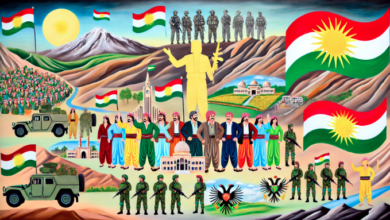NewsUncategorized
The Triple Alliance and the Kurdish Issue
The Triple Alliance and the Kurdish Issue
The growing cooperation between Israel, Greece, and Cyprus in recent years represents a strategic shift in the Eastern Mediterranean, encompassing various fields such as security, energy, and military coordination. For Turkey, and specifically for President Recep Tayyip Erdogan, this trilateral alliance is not merely economic or military cooperation between three countries; it constitutes a direct threat to Turkey’s interests and national security, intensifying its concerns.
On the military front, the three countries regularly conduct joint exercises, including multiple air and naval maneuvers aimed at enhancing their defensive capabilities and coordination against potential threats in the Mediterranean. From Turkey’s perspective, these exercises send a clear and direct message, as Ankara views them as attempts to undermine its influence in a region it considers strategically significant. With ongoing disputes with Greece over issues such as maritime boundaries and gas exploration rights, Turkey perceives the alliance between Israel and Greece, with Cyprus’ support, as an effort to reduce its regional role and position as a key player, posing a challenge to its security strategies.
The alliance’s cooperation in the energy sector is another area that raises Ankara’s concerns. This coalition is working on major projects to exploit gas reserves in the Eastern Mediterranean. The EastMed pipeline project, which aims to transport gas from Israeli and Cypriot fields to Europe via Greece, is part of these efforts and serves as an alternative for Europe to traditional energy sources, increasing the strategic importance of this trilateral alliance economically and politically. For Turkey, which aspires to be a regional energy transit hub to Europe, the success of these projects diminishes its role and heightens its economic and geopolitical isolation. This, in turn, drives Turkey to adopt a hardline stance in the Mediterranean and expand its military movements in disputed areas.
In addition to these alliances, the Kurdish issue remains another factor complicating the situation for Erdogan. Turkey perceives the Kurdish question as an existential threat to its territorial integrity, as it has long been embroiled in an armed conflict with the Kurdistan Workers’ Party (PKK), which seeks self-rule for the Kurds. Although Israel does not openly support Kurdish demands in Turkey, Ankara fears that Israel could leverage this issue as a pressure card, especially given the support of some international powers for the Kurdish People’s Protection Units (YPG) in Syria, which Turkey regards as an extension of the PKK. In Syria, Turkey is concerned that these alliances could encourage regional and international powers to support the creation of an independent Kurdish region, potentially fueling Kurdish demands within Turkey itself.
The rise of these alliances and the overlapping regional interests, whether in the Mediterranean or in Syria, deepen Erdogan’s concerns and drive him to adopt a mobilizing discourse portraying himself as a defender of Turkish national security against what he describes as hostile coalitions aiming to isolate and weaken Turkey’s regional role. While a direct invasion by Israel may not be an imminent threat, Erdogan views these alliances as an attempt to encircle Turkey and curtail its influence, reflecting his apprehensions about the internal and external challenges his country faces, particularly with escalating economic crises and a decline in his popularity.
